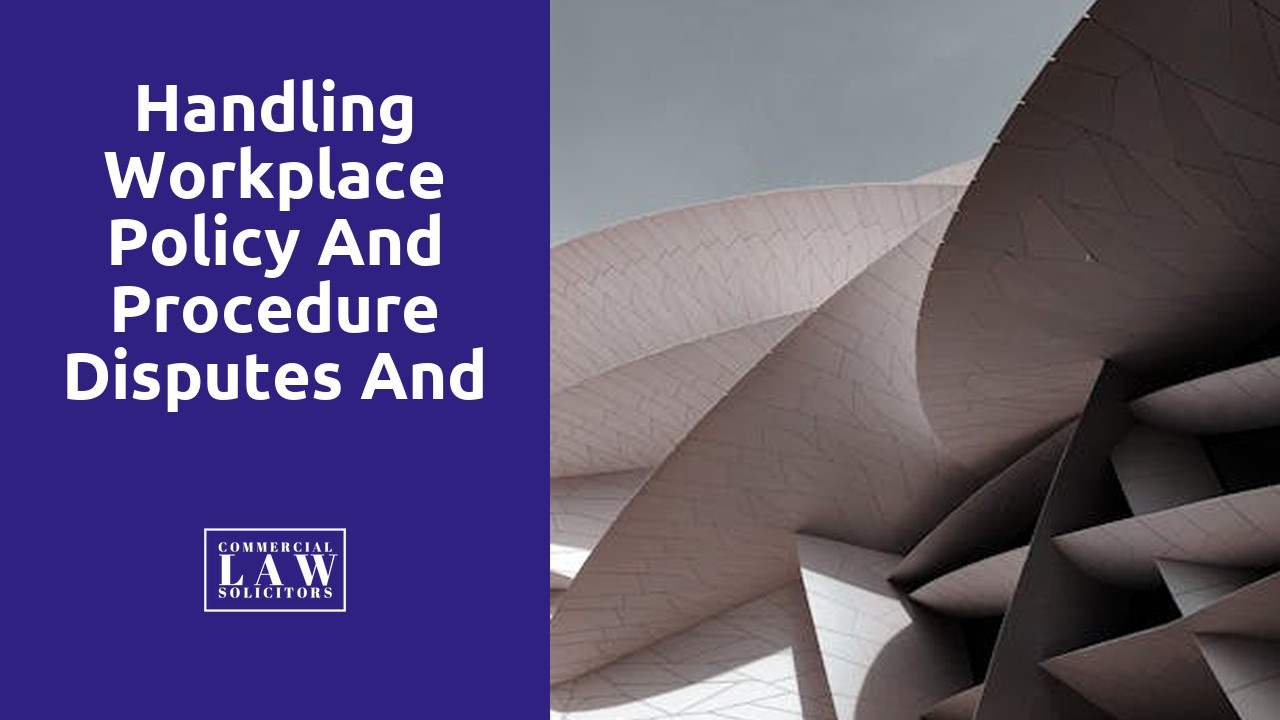Handling Workplace Policy and Procedure Disputes and Resolutions

Navigating the Maze: Resolving Workplace Policy and Procedure Disputes
Navigating the complex terrain of workplace policy and procedure disputes can be a daunting task. These disputes often arise when employees have differing interpretations of established policies or procedures, leading to confusion and tension within the workplace. As such, it is crucial for organizations to have effective mechanisms in place to resolve these conflicts and pave the way for a harmonious and productive work environment.
One key strategy for navigating these disputes is to promote open and transparent communication between all parties involved. Encouraging dialogue and active listening can help to identify the underlying issues and concerns that are fueling the dispute. By establishing a safe and constructive space for discussing differing perspectives, employees can work towards finding a mutually agreeable solution. Additionally, providing clear and concise guidelines on how disputes should be reported and addressed can help streamline the resolution process, reducing unnecessary delays and friction.
The Art of Conflict Resolution in the Workplace
Conflict is an inevitable part of any workplace. Whether it stems from differing opinions, miscommunication, or contrasting work styles, conflicts can quickly arise and disrupt the harmony of a team or organization. However, the art of conflict resolution is essential in maintaining a positive work environment and ensuring productivity.
One crucial aspect of conflict resolution is active listening. When engaged in a conflict, it is imperative to truly hear and understand the other person's perspective. This means setting aside personal biases and assumptions and focusing on the words and emotions being expressed. By demonstrating empathy and giving individuals the space to fully express themselves, conflicts can often be diffused or resolved amicably. Additionally, active listening promotes a sense of mutual respect and understanding, fostering a more cohesive and collaborative work environment.
Unraveling Workplace Policy and Procedure Dilemmas
The workplace can be a complex environment, filled with policies and procedures that dictate how employees should conduct themselves. However, it is not uncommon for dilemmas to arise when it comes to interpreting and implementing these rules. These dilemmas can lead to confusion, frustration, and even conflict among employees.
When faced with workplace policy and procedure dilemmas, it is essential to approach the situation with a calm and objective mindset. Reacting emotionally or impulsively may only exacerbate the issue and hinder any potential resolution. Instead, take the time to thoroughly review the policies in question and seek clarification if needed. Open and respectful communication with supervisors or human resources personnel is crucial to gaining a better understanding of the dilemma and identifying potential solutions. By working together to unravel these dilemmas, organizations can foster a more harmonious and productive work environment.
Finding Common Ground: Negotiating Workplace Disputes
In the workplace, conflicts and disputes are almost inevitable. With so many different personalities, opinions, and work styles coming together, it's bound to happen. However, the key to resolving these disputes lies in finding common ground through negotiation.
Negotiating workplace disputes requires a delicate balance of assertiveness and cooperation. It's important to clearly communicate your needs and concerns while also being open to the needs and concerns of others. By actively listening and seeking to understand the perspectives of others, you can begin to bridge the gap and find a mutually agreeable solution. Remember, the goal is not to "win" the negotiation, but rather to reach a resolution that works for everyone involved.
Strategies for Resolving Workplace Policy and Procedure Conflicts
In the complex world of workplace policy and procedure conflicts, having effective strategies for resolution is essential. These conflicts can arise from a variety of sources, whether it's disagreements over different interpretations of policies or conflicts between individuals with opposing views on procedural matters. Regardless of the origin, it is crucial for organizations to have robust strategies in place to navigate through these disputes and find viable solutions.
One of the key strategies for resolving workplace policy and procedure conflicts is open and transparent communication. It is imperative for all parties involved to express their concerns, share their perspectives, and actively listen to each other. By fostering an environment of open dialogue, employees can gain a better understanding of each other's viewpoints and work collaboratively towards finding common ground. Additionally, clear and concise communication can help clarify any misconceptions or ambiguities in policy and procedure, preventing future conflicts from arising.
Mastering the Fine Art of Workplace Dispute Resolution
Mastering the Fine Art of Workplace Dispute Resolution
Workplace disputes are an inevitable aspect of professional life, but they need not lead to a breakdown in communication or hamper productivity. With the right approach, conflicts can be resolved effectively, fostering a harmonious work environment. The key lies in mastering the fine art of workplace dispute resolution.
First and foremost, it is important to approach conflict resolution with a calm and objective mindset. Taking a step back and analyzing the situation with a clear head allows for a more rational assessment of the issue at hand. This helps to avoid knee-jerk reactions or the escalation of emotions, which can further complicate the resolution process. Additionally, active listening plays a crucial role, as it demonstrates a genuine interest in understanding the perspectives and concerns of all parties involved. By actively listening and seeking to understand, rather than simply waiting for one's turn to speak, a foundation of trust and empathy can be established, contributing to a more constructive dialogue.
Related Links
Training Employees on Workplace Policies and ProceduresImportance of Workplace Policies and Procedures in Preventing Legal Issues
Addressing Employee Questions and Concerns about Workplace Policies and Procedures
Dealing with Violations of Workplace Policies and Procedures